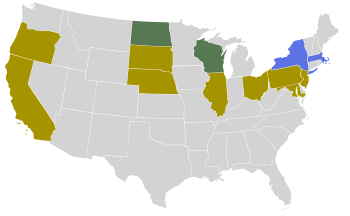This article needs additional citations for verification. (May 2022) |
| |||||||||||||||||||||||||||||
1,074 delegates to the Republican National Convention[1][2] 538 votes needed to win | |||||||||||||||||||||||||||||
|---|---|---|---|---|---|---|---|---|---|---|---|---|---|---|---|---|---|---|---|---|---|---|---|---|---|---|---|---|---|
| |||||||||||||||||||||||||||||
Taft Roosevelt/Not Voting[a] La Follette Cummins | |||||||||||||||||||||||||||||
| |||||||||||||||||||||||||||||
From January 23 to June 4, 1912, delegates to the 1912 Republican National Convention were selected through a series of primaries, caucuses, and conventions to determine the party's nominee for President in the 1912 election. Incumbent President William Howard Taft was chosen over former President Theodore Roosevelt.[4] Taft's victory at the national convention precipitated a fissure in the Republican Party, with Roosevelt standing for the presidency as the candidate of an independent Progressive Party, and the election of Democrat Woodrow Wilson over the divided Republicans.
For the first time, a large number of delegates were selected through direct primary elections rather than local or state party conventions. Primary elections were a progressive reform supported by Roosevelt and his allies, and the primaries were largely dominated by Roosevelt or Robert M. La Follette, a fellow progressive who entered the race early. However, President Taft was equally dominant under the traditional caucus and convention systems, where executive patronage power could be leveraged in his favor and party bosses were able to maneuver delegations towards him.
At the conclusion of the delegation selection process, Roosevelt had won 411 instructed delegates, Taft had 201, and 254 were contested between the two candidates. Of the remaining delegates, 46 were pledged to the minor candidates Albert B. Cummins and Robert M. La Follette and 166 were uninstructed.[5] In the end, Taft won the vast majority of the contests over delegate credentials, delivering him a working majority outright, and many Roosevelt supporters abstained from voting at the convention before bolting to form their own party.
Cite error: There are <ref group=lower-alpha> tags or {{efn}} templates on this page, but the references will not show without a {{reflist|group=lower-alpha}} template or {{notelist}} template (see the help page).
- ^ Chace 2004, p. 113.
- ^ Morris 2010, p. 176.
- ^ Gould 1976, p. 33.
- ^ Kalb, Deborah (2016-02-19). Guide to U.S. Elections - Google Books. CQ Press. ISBN 9781483380353. Retrieved 2016-02-19.
- ^ Gould 1976, p. 44.
© MMXXIII Rich X Search. We shall prevail. All rights reserved. Rich X Search





